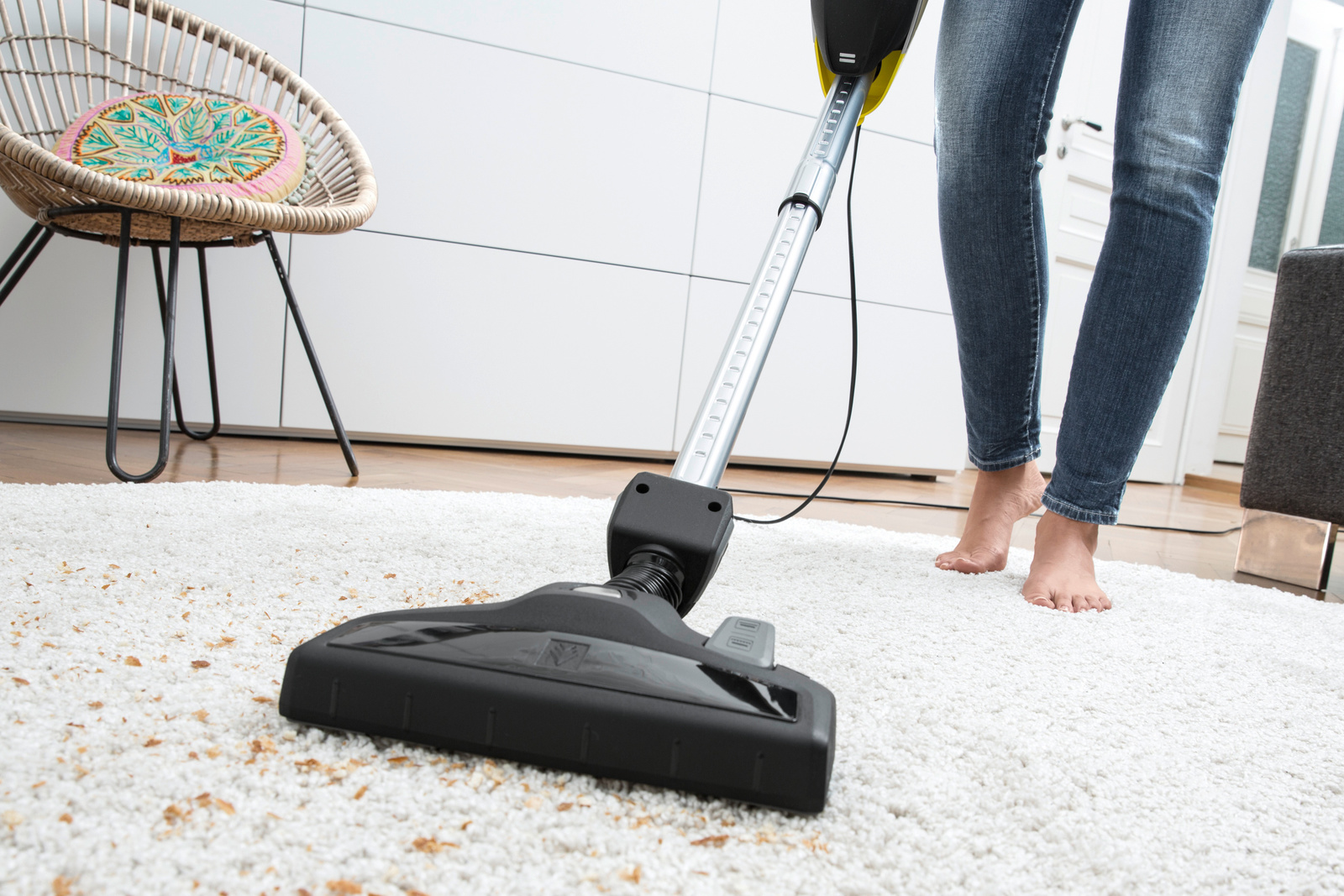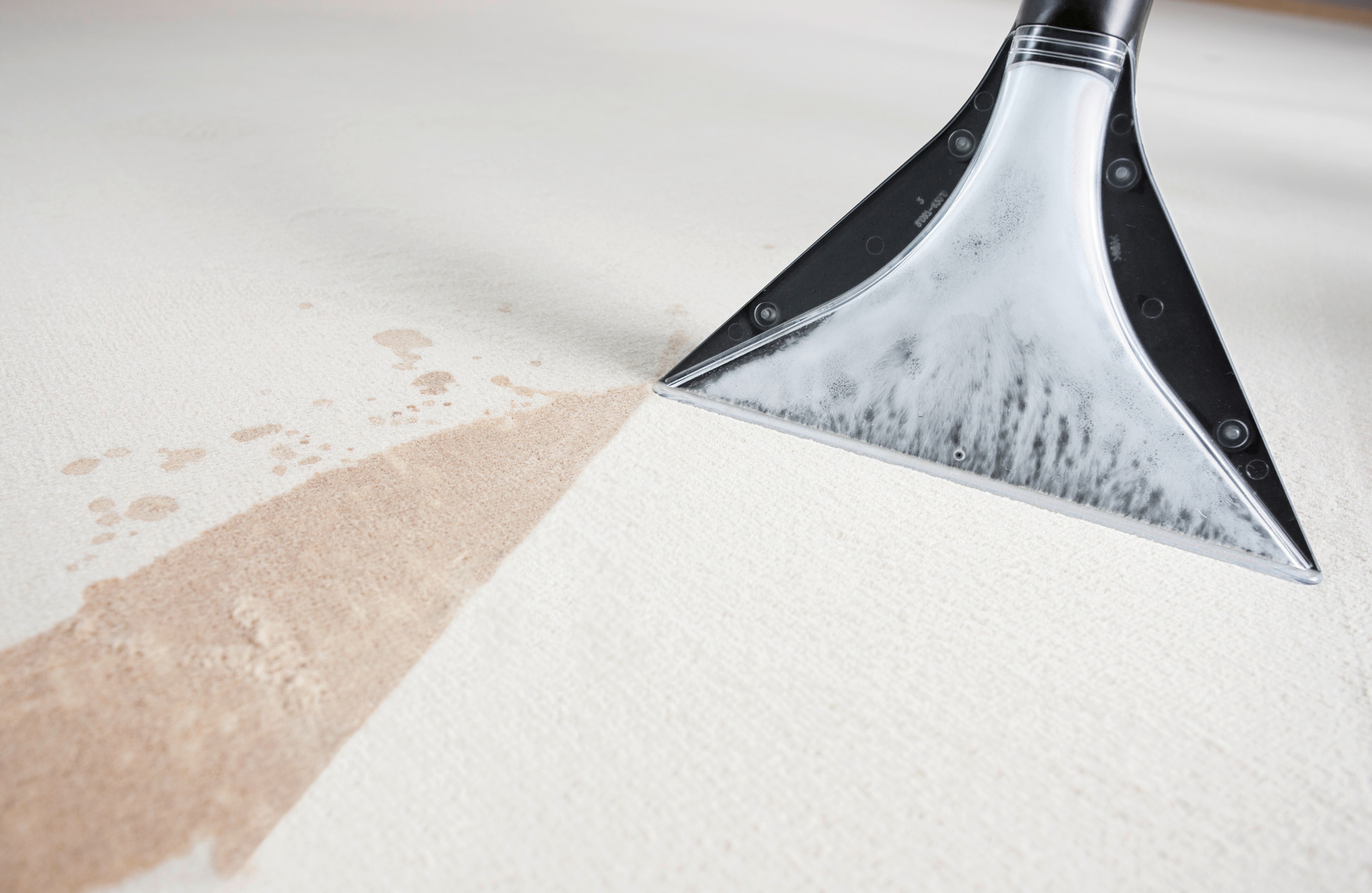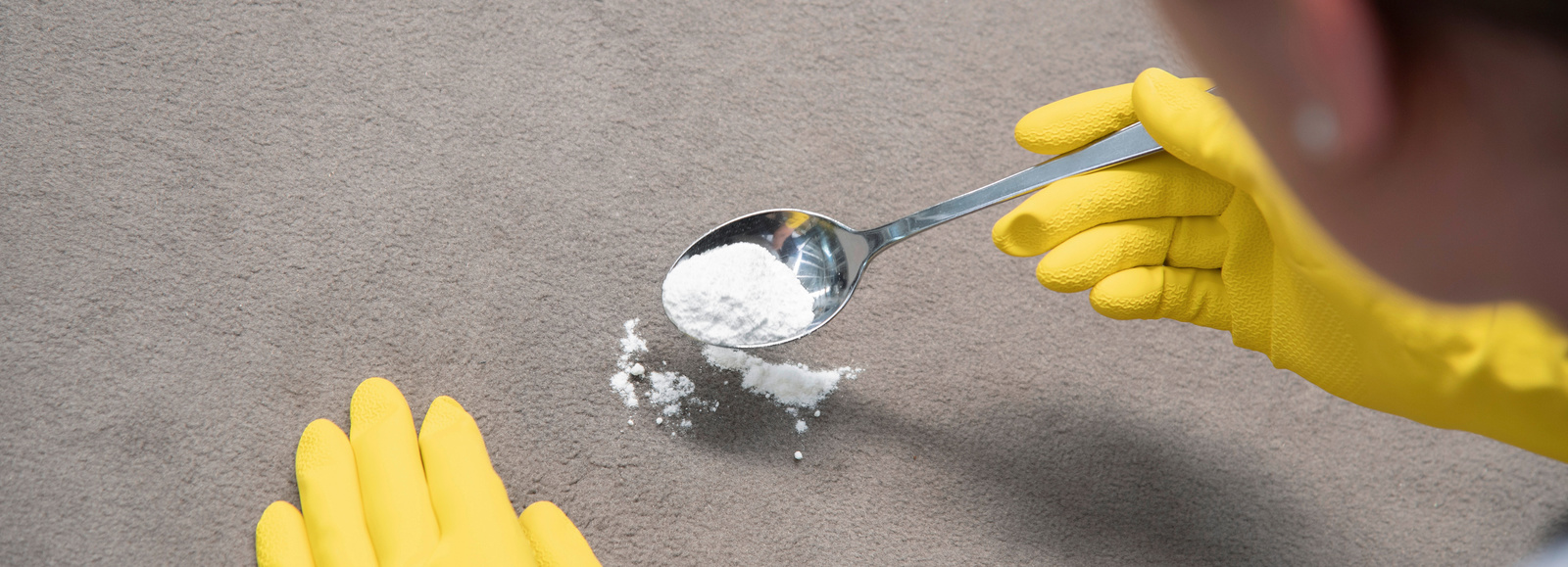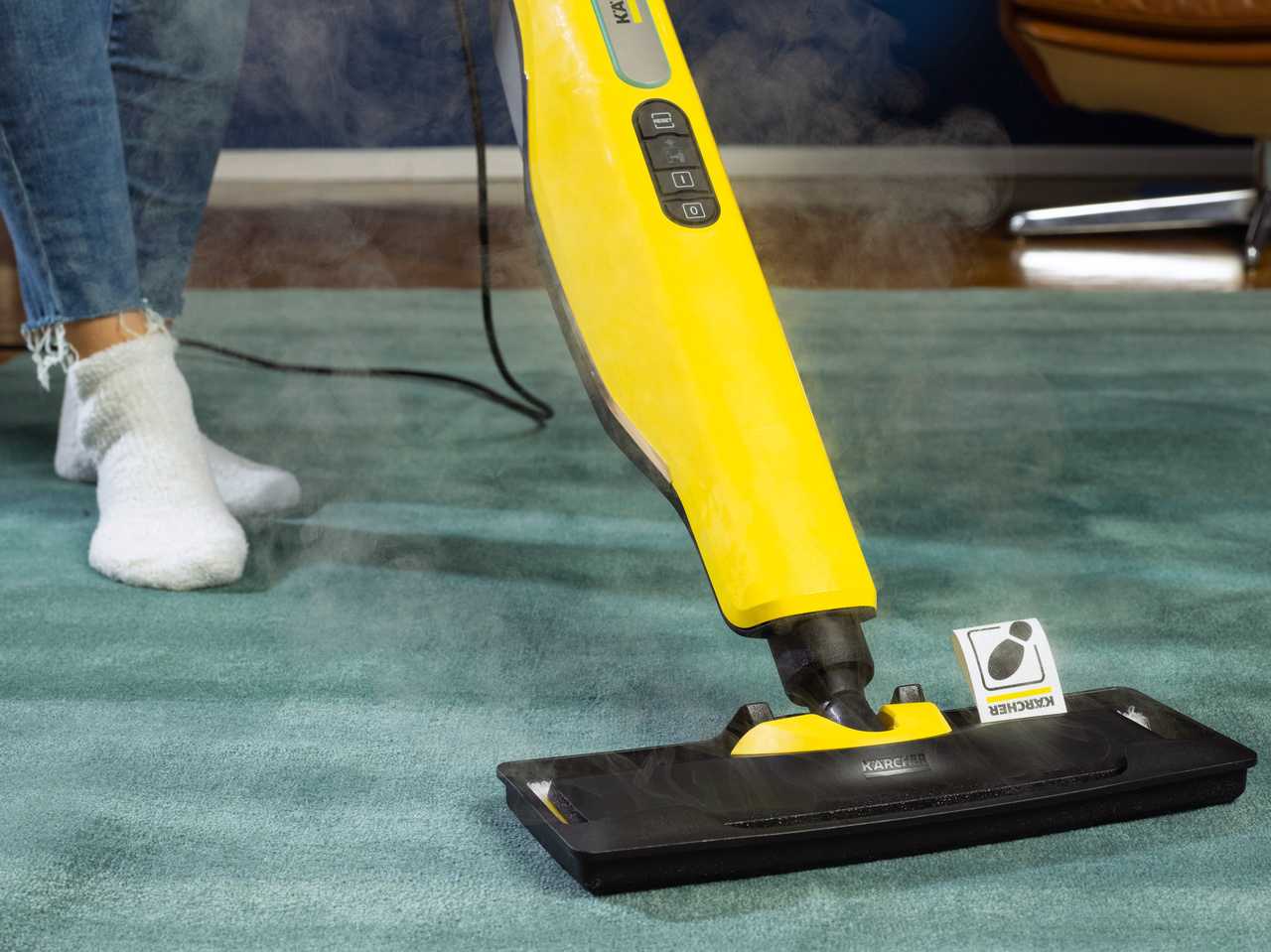Carpet cleaning made easy
A floor has to put up with a lot each day: Pet paw prints, biscuit crumbs, coffee stains or dirty shoe-soles – with carpets in particular, a lot of dirt is accumulated over time. The best way to clean carpeted floors and to quickly remove even stubborn stains – an overview.

Why should you clean carpets regularly?
A beautiful carpet makes the home feel cosy, emphasises features, and keeps your feet warm. The textile floor covering not only looks good, but it also improves slip-resistance, and dampens the noise of footsteps. The length of the pile determines how easy or demanding it is to maintain a carpeted floor. The maintenance effort is also determined by how often the carpet is used. For all carpets, regular and thorough cleaning is recommended: This maintains the appearance, increases the lifetime and, furthermore, ensures hygiene, since heavily ingrained dirt is loosened and pet hair and harmful mites are removed.

Vacuuming regularly
Irrespective of the pile length, a carpet should be thoroughly vacuumed at least once a week. Vacuum cleaners generally have a switchable floor nozzle, on which you can choose between a setting for hard floors and a setting for carpets and rugs. For a deep-pile carpet, a smooth carpet brush can be used since otherwise the fibres may come loose. For textile floor coverings, i.e. fitted carpets, the result can be improved by using a turbo nozzle. As a general rule: When vacuuming, you should always work slowly and move the nozzle evenly over the floor.
If children or pets live in your home, we also recommend occasionally using a cordless electric broom or a cordless vacuum cleaner to give a quick clean.

Deep cleaning: Clean fibre-deep thanks to spray extraction cleaning
Even if you regularly vacuum dust, carpets become unsightly over time. This is because, when you vacuum, dirt is only removed from the surface. By carrying out a more intensive clean of the carpet at longer intervals, you can remove all of the dirt that has formed over time despite regular cleaning. Deep cleaning with a spray extraction cleaner increases the lifetime of a carpet and improves hygiene because this also removes dirt, grease residues and unpleasant odours that are stuck between the fibres .
The principle is simple: During spray extraction cleaning, the water and detergent are sprayed on in one step and then immediately vacuumed up again with the dirt. In a second work step, you should rinse with clean water to remove the last detergent residues. The carpet should also be completely dry before you walk on it again. After drying, it can then be thoroughly vacuumed once again.
Additional tips for working with the spray extraction cleaner:
- Warm water improves the cleaning performance and the result when compared to cold water. But caution: It must not be hot, as otherwise the fibres (for example on wool carpets), or even the adhesive layer on glued carpets, may become damaged.
- On carpeted floors, the underfloor heating should be switched off before cleaning. This is to ensure that the heating used for drying does not cause discolourations or material changes.
- Always test the cleaning power in an inconspicuous area first.
Incidentally, you can not only use the spray extraction cleaner to deep-clean carpets, but also to clean upholstery, mattresses and car seats.
Washing carpet
Depending on the material and size, you can also wash carpets. Smaller carpets that are made from cotton, wool or synthetic fibres (such as polyester) are particularly easy to clean. They can therefore be washed by hand or in the washing machine at 30 °C in a delicate wash programme. For all other materials, such as velvet, sisal or coconut fibre, it is better to only clean with water and a suitable cleaning agent on specific areas.

Removing stains from carpets
Whether when eating, when watching TV on the sofa, or when children are playing in the home – food residues, drinks and dirt often hit the carpet quicker than you can even react. But don't panic: With the right tips, you can get rid of the stains.
Tip 1: Act quickly
For damp stains in particular, immediate action is required because liquids can quickly penetrate the fibres of the carpet and are often then even more difficult to remove. If an accident happens, you should therefore quickly soak up the liquids with a dry cloth or lots of kitchen roll. However, do not apply any pressure when doing this, since red wine, juice, etc. can soak further into the carpet and damage the fibres of the carpet.
Tip 2: Try with water first
Around 90 per cent of all stains are water-soluble. Before turning to detergents or household remedies, it is worthwhile trying a clean cloth and some warm water first. If the stain dissolves, you can remove it from the fibres by making slight rotating movements from the bottom to the top. For stains that do not dissolve, a universal stain remover can help: Spray the stain remove onto a colour-resistant cloth and dab the affected area until the stain is dissolved. With both methods, you should always ensure that you use a clean area of the cloth.
The best household remedies for cleaning carpets
- Baking powder: Baking powder is a real all-rounder in the home, and it can also be used to remove stains. Put some powder on the affected area and carefully drip hot water over it. This opens the pores of the fibre. After a few hours contact time, the baking powder can be dabbed or vacuumed away again. The stain should have vanished.
- Bicarbonate of soda: In addition to baking powder, bicarbonate of soda is also a tried-and-tested household remedy for dirty carpets. Spread it evenly over the stain, dampen with water, and leave to work. As soon as everything is dry, vacuum the powder residue with the vacuum cleaner.
- Vinegar: Vinegar not only helps to tackle dirt and limescale – it also works against stains. To clean carpets, it is best to use vinegar essence because it is colourless and can be diluted with water. Mix water and vinegar essence at a ratio of 1:1 and use a cotton cloth to apply this mixture to the stain. When doing this, only dab the affected area carefully – do not rub it. Leave it to work for half an hour and then thoroughly wipe it away again using clean water.
- Shaving foam: Place the foam on the stain and use a brush or cloth to slowly rub it in. Leave it to work for at least one hour. You can then use a cloth to carefully rub off the shaving foam together with the loosened dirt.
- Salt: One tried-and-tested household remedy for red wine stains is salt: Starting from the outside in, sprinkle the salt on the stain and leave it to dry. The liquid is absorbed by the salt grains. After a few hours, the salt can simply be vacuumed up.
However, for delicate carpets and stains that have already dried in and can no longer be removed using conventional detergents and household remedies, you should always consider having the carpet cleaned professionally.


Refreshing carpet fibres with the steam cleaner
When you move furniture, you often encounter a problem: Furniture dents that are clearly visible where the furniture previously stood on the carpeted floor. You can use a steam cleaner to raise the carpet fibres again so that the unsightly dents disappear: Simply place a dry cloth at the affected area and spray it with hot steam. The water lets the fibres slowly swell and return to their original form.
An alternative is a carpet glider, which is available as an accessory for the steam cleaner. Once secured to the floor nozzle, this can be lightly moved over the carpet. Positive side-effect: This not only raises the textile fibres, it also reduces unpleasant odours in the carpet.
This approach can also be used after cleaning the carpet, or simply to freshen up the carpet fibres occasionally. This keeps the carpet looking better for longer.







